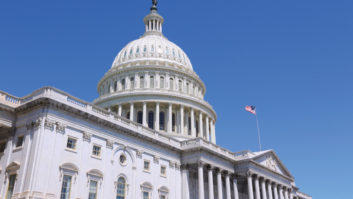A group of EEO rule supporters are standing against a tide of comments from broadcast groups to reiterate that the FCC’s equal employment opportunity rules prevent discrimination, promote competition, advance minority ownership and should remain a matter of the highest priority.
The filing is led by the Multicultural Media, Telecom and Internet Council and is supported by 37 individual groups that make up the EEO supporters list including the Black College Communication Association, League of United Latin American Citizens and the National Asian American Coalition.
[Read: Additional EEO Rules Are Unjustified and Unnecessary, According to NAB]
The group lays out five key proposals that are aimed at helping the commission fulfill the goal of alleviating discrimination in the electronic mass media industry. Among those proposals are the suggestion that EEO data be gathered for research on industry trends and EEO program effectiveness; EEO data be requested from licensees found to have failed to engage in required recruitment efforts; stations submit certifications as proof that job postings occurred before hiring decisions were made; additional audits be undertaken in case of probable-cause violations; and the commission open an inquiry into the pattern of consistently low representation of minorities in radio news.
According to the group, existing EEO regulations are helping to ensure that all qualified persons, including minorities and women, can learn of and compete on an equal footing for job openings.
“Talent and creativity are what makes broadcasting and multichannel video competitive with other media industries,” the group said in its filing. “The diversity of the employee pool is an especially critical input in these industries, which require an ever-growing stream of creative people on the line staff and in management. In a business such as media, whose product is the distribution of the fruits of talent, it is unsound economic policy to exclude or drive out anyone on a basis other than merit.”
The rules also help advance minority ownership, the group said in its first filing in September. “Any weakening of EEO enforcement … would convert radio deregulation into a cynical ‘bait and switch’ — a broken treaty with the American people. We must never overlook the important role played by the EEO rules in facilitating minority ownership by providing an entry pathway and opportunity for hands-on training for tomorrow’s broadcast owners,” the group said.
In a second comment filed in November, the EEO supporters said that EEO regulation is not only necessary but also justified from a cost-benefit standpoint.
“The costs of enforcement and compliance to the FCC and regulatees, respectively, are minimal, and the benefits are enormous,” the group said. “That cost here consists of the additional effort, beyond those costs that attend standard personnel administration, required to ensure that all job openings are timely posted online and are emailed to a list of community groups. Thanks to online recruitment, that cost is virtually zero.”
Responding to comments from the National Association of Broadcasters, the EEO Supporters said the NAB is conspicuously absent from making any suggestions on what the commission can do to combat cronyism or other forms of discrimination.
“Looking back at the nation’s history, and particularly at the history of broadcasting pre-1968, it cannot be said that federal nonintervention, or federal looking-the-other-way, or federal cutbacks in civil rights enforcement, or civil rights ‘self-regulation,’ ever were effective strategies in combating race and gender discrimination,” the group said.
“Aggressive, proactive federal leadership was manifestly required and still is today,” the group said.
The group said that the question that all parties — including the NAB — should be answering is: What can the commission do, right now, to finally and successfully finish the job of opening the doors of the nation’s most influential industries to all individuals?
These comments and others are being made as part of the FCC’s request for reply comments on the commission’s Equal Employment Opportunity Compliance and Enforcement Notice of Proposed Rulemaking. Those comments are housed in the commissions’ ECFS database using Media Bureau Docket Number 19-177.







